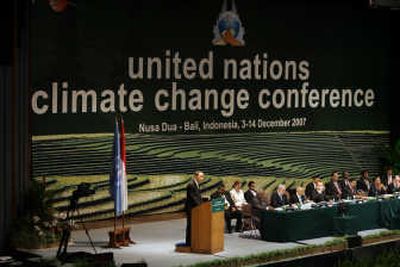U.S. blocks U.N. effort to cut gases

BALI, Indonesia – U.N. Secretary-General Ban Ki-moon conceded Wednesday that the United States had succeeded in achieving one of its key objectives at the climate conference here, blocking a proposal that called on industrialized nations to cut their greenhouse gas emissions by 25 percent to 40 percent by 2020.
Having jettisoned the idea of incorporating specific emissions targets in the framework that will guide international climate talks over the next two years, participants were hoping to find other ways to make meaningful progress here in the two-week-long meeting of nearly 190 nations.
Ban, who told reporters the U.N. initial negotiating proposal submitted to the conference might have been “too ambitious,” said he and others would work to ensure that any climate pact finalized in 2009 will be much more specific than the consensus document that is expected to come out of Bali.
“Practically speaking, this will have to be negotiated down the road,” he said, adding that the proposal to cut emissions by at least 25 percent over the next dozen years reflected the current scientific consensus. “There needs to be a target, whether it’s a short-term, medium- or long-term” goal.
The Bush administration’s victory, which came even as a succession of foreign ministers took the podium to call for bolder action to fight global warming, sparked criticism from developing countries that are predicted to feel the greatest effects from a changing climate.
Robert Aisi, Papua New Guinea’s U.N. ambassador, said he understood why American officials are reluctant to accept binding emissions goals unless rapidly industrializing nations like China, India and Brazil also commit to concrete efforts. But, he added, the United States and other Western nations are overlooking their historical role in producing greenhouse gases as they industrialized.
“The U.S. is saying, ‘Why should we restrict ourselves?’ ” Aisi said in an interview. “We’re saying, as developing countries, ‘You bear a responsibility.’ “
Several leaders of industrialized nations also called on the United States to embrace a specific emissions target now rather than later. German environment minister Sigmar Gabriel told the delegates that the goal of reducing emissions by 30 percent by 2020 “should not be questioned. Otherwise the industrialized countries lose their credibility. And such a reduction by 30 percent by 2020 should also be acceptable to the United States of America.”
In a press conference Wednesday, however, Paula Dobriansky, U.S. undersecretary of state for democracy and global affairs, said, “We want to launch a process that is open and does not predetermine or preclude options.”